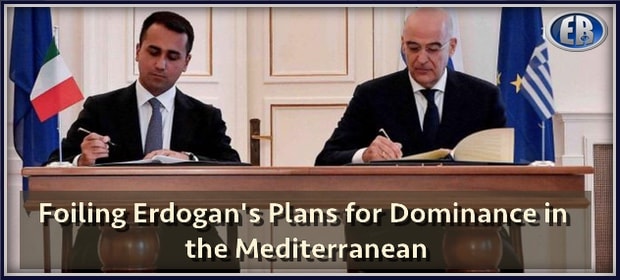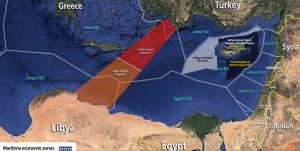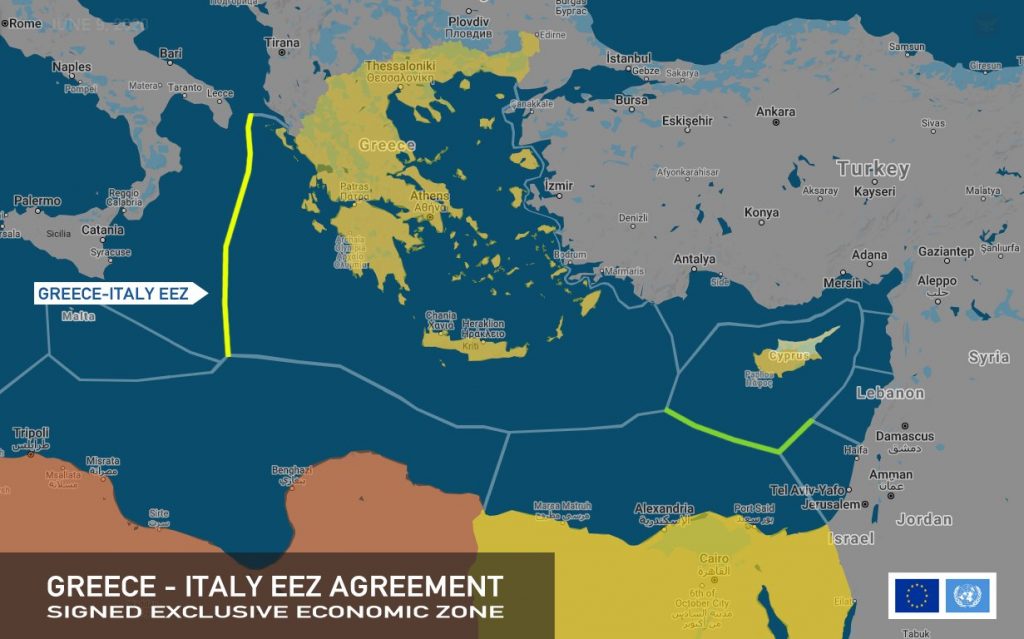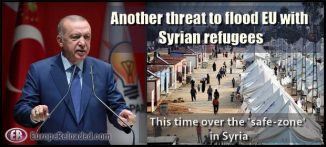
ER Editor: We remind readers of a piece we ran in February 2020 by Mike Whitney titled Gas Wars in the Mediterranean, Turkey Goes for Broke. Of note:
The unexpected alliance between Turkey and Libya is a geopolitical earthquake that changes the balance of power in the eastern Mediterranean and across the Middle East.
Turkey’s audacious move has enraged its rivals in the region and cleared the way for a dramatic escalation in the 9 year-long Libyan civil war. It has also forced leaders in Europe and Washington to decide how they will counter Turkey’s plan to defend the U.N-recognized Government of National Accord (GNA), and to extend its maritime borders from Europe to Africa, basically creating “a water
corridor through the eastern Mediterranean linking the coasts of Turkey and Libya.” Leaders in Ankara believe that the agreement “is a major coup in energy geopolitics” that helps defend Turkey’s “sovereign rights against the gatekeepers of the regional status quo.” But Turkey’s rivals strongly disagree. They see the deal as a naked power grab that undermines their ability to transport natural gas from the East Mediterranean to Europe without crossing Turkish waters. In any event, the Turkey-Libya agreement has set the stage for a broader conflict that will unavoidably involve Egypt, Israel, UAE, Saudi Arabia, Europe, Russia and the United States. All parties appear to have abandoned diplomatic channels altogether and are, instead, preparing for war.
The map below shows how the Turkey-Libya (GNA side in Tripoli) expectations of territorial dominance oppose the UN Charter Law of the Sea (UNCLOS) assignment of sovereignty based on the continental shelves:

The article below explains how Greece’s new deal with Italy, as well as potential new deals with Libya (the eastern part based in Tobruk) and Egypt, goes a long way to scuppering Erdogan’s plans for dominance in the Mediterranean.
********
Update: We entirely recommend this Duran video discussion (June 13, 2020) of the complex situation surrounding Erdogan’s success in turning around the Libyan situation, which gives a much greater perspective on this issue:
********
Greek-Italian Maritime Deal Disrupts Turkey’s Endeavour for East Mediterranean Dominance
PAUL ANTONOPOULOS
Greece and Italy signed a historic agreement yesterday (ER: June 9, 2020) that demarcates the Exclusive Economic Zones (EEZ) of the two countries in the Ionian Sea. The agreement signed between Greek Foreign Minister Nikos Dendias and his Italian counterpart Luigi Di Maio has many ramifications in the entire Eastern Mediterranean region, but especially against Turkey’s ambitions of East Mediterranean hegemony.
The agreement helps establish Italy as an energy player, especially as it has already taken an active position in the construction of the Eastmed pipeline – a major project between Greece, Cyprus and Israel, whose joint pipeline will eventually reach Italy through a secondary pipeline project. The EEZ signing comes as Greece, Cyprus, Israel and Egypt have strengthened their relations at a time when Italy was acting unilaterally to serve their own interests. This changed, however, as Rome was becoming increasingly excluded from developments in the region. An example of this is Italy not having as much influence as they wanted over the war in Libya. By acting unilaterally, albeit not as aggressively as Turkey, Rome ran the risk of being completely left on the fringes of East Mediterranean issues. This is because Greece, Cyprus, Israel and Egypt continued to make deals, improve multilateral relations and assert strong influence over events in the region.
The EEZ agreement was also a first such deal for Greece. Greece also shares a maritime border with Turkey, Cyprus, Egypt, Libya and Albania and now has a legal precedent which will quickly lead to Athens signing EEZ agreements with other neighbouring states, with some speculating Athens could sign one with Egypt as soon as next week.
Source: InfoBrics
In fact, the Libyan House of Representatives, based in the eastern city of Tobruk and in opposition to the Turkish-backed Muslim Brotherhood government in Tripoli, congratulated Greece and Italy on their peaceful resolution to their maritime border issues through international law. The Libyan House of Representatives then called on Greece to make a maritime EEZ agreement with them that would undermine the Turkey-Tripoli deal as it would be in accordance to the United Nations Charter Law of the Sea (UNCLOS).
From the Greek perspective, the signing of an EEZ with Italy has massive ramifications for Turkey’s plans to steal oil and gas from Greece’s maritime zone – thus hindering its efforts for complete East Mediterranean dominance. In November last year, Turkey signed a maritime deal with the Muslim Brotherhood government in Libya to carve out Greece’s oil and gas rich waters between them without acknowledging that islands were in EEZ. UNCLOS defends Greece’s vision of how the EEZ between Greece and Turkey should look. However, this is rejected by Ankara, which refuses to acknowledge that islands have an EEZ or continental shelves, and is the main reason why Turkey is one of only 15 countries in the whole world not to sign and/or ratify UNCLOS.
The biggest obstacle to the Turkey-Libyan Muslim Brotherhood pact will be the declaration of a Greek EEZ with Egypt. Greece and Italy resolved their EEZ borders by using international law, and it is expected that Greece and Egypt will also use UNCLOS. Meanwhile, the Turkey-Libya deal has been widely condemned, even from Turkey’s closest allies like Germany, and has not received a single confirmation or support from outside of Ankara and Tripoli.
Turkish media, which is overwhelmingly controlled by the state, reacted negatively to the Greece-Italy deal, knowing the ramifications it would have on Turkey’s own ambitions to steal Greek maritime space.
Haber Global said “The move to escalate tension in the Eastern Mediterranean by Italy and Greece!”
Milliyet headlined “’Greece seeks international support’ Panic in Greece!”
Haber 7 declared “Greece and Italy agreed to establish an Exclusive Economic Zone (EEZ) at a time when tensions escalated due to natural gas drilling work in the Eastern Mediterranean.”
Turkish Energy Minister Fatih Dönmez announced earlier this month that a drilling vessel of the Turkish Petroleum Corporation will start oil exploration operations to the immediate south of the Greek island of Crete “within three to four months.”
This prompted a flurry of responses from Athens, with Greek government spokesman Stelios Petsas saying “we are not afraid. We are getting prepared for any possibility;” Defence Minister Nikos Panagiotopoulos saying “We do not want to go there, but we want to make it clear that we will do whatever it takes to defend our sovereign rights to the fullest extent possible;” and, General Konstantinos Floros saying that “the Greek Armed Forces are ready to fulfil their duty and carry out their mission of the Constitution from Evros to Kastellorizo if and when required.”
Greece wants to resolve issues diplomatically and peacefully, as it repeatedly calls to do with Turkey and has done so with Italy, but is willing to militarily fight against Turkey, a fellow NATO member, if its maritime space is violated. In light of the Greek-Italian EEZ deal, it is unlikely that Turkey will provoke a war as Italy, one of the major powers in the European Union, has confirmed that islands do indeed have an EEZ despite Ankara’s objections.
The EU already showed support for Greece, with Josep Borrell, the European Union’s foreign policy chief, expressing condemnation against Turkey’s provocative actions.
“We are in close contact with our colleagues, the foreign ministers of Greece and also Cyprus, in order to follow the situation of the drillings, and we are calling on Turkey to stop drilling in the areas where there is the EEZ or territorial waters of Cyprus and Greece,” said Borrell, adding that the Foreign Affairs Council “already delivered a strong message addressed to Turkey.”
The question remains whether Turkey will risk a war with Greece by drilling for oil and gas in Greek maritime waters in the next three or four months. It likely will not happen as Turkey has no support in the EU, but a withdrawal will also demonstrate that Ankara is utterly failing in their project for East Mediterranean hegemony.
************
Original article
Paul Antonopoulos is an independent geopolitical analyst

••••
The Liberty Beacon Project is now expanding at a near exponential rate, and for this we are grateful and excited! But we must also be practical. For 7 years we have not asked for any donations, and have built this project with our own funds as we grew. We are now experiencing ever increasing growing pains due to the large number of websites and projects we represent. So we have just installed donation buttons on our websites and ask that you consider this when you visit them. Nothing is too small. We thank you for all your support and your considerations … (TLB)
••••
Comment Policy: As a privately owned web site, we reserve the right to remove comments that contain spam, advertising, vulgarity, threats of violence, racism, or personal/abusive attacks on other users. This also applies to trolling, the use of more than one alias, or just intentional mischief. Enforcement of this policy is at the discretion of this websites administrators. Repeat offenders may be blocked or permanently banned without prior warning.
••••
Disclaimer: TLB websites contain copyrighted material the use of which has not always been specifically authorized by the copyright owner. We are making such material available to our readers under the provisions of “fair use” in an effort to advance a better understanding of political, health, economic and social issues. The material on this site is distributed without profit to those who have expressed a prior interest in receiving it for research and educational purposes. If you wish to use copyrighted material for purposes other than “fair use” you must request permission from the copyright owner.
••••
Disclaimer: The information and opinions shared are for informational purposes only including, but not limited to, text, graphics, images and other material are not intended as medical advice or instruction. Nothing mentioned is intended to be a substitute for professional medical advice, diagnosis or treatment.





